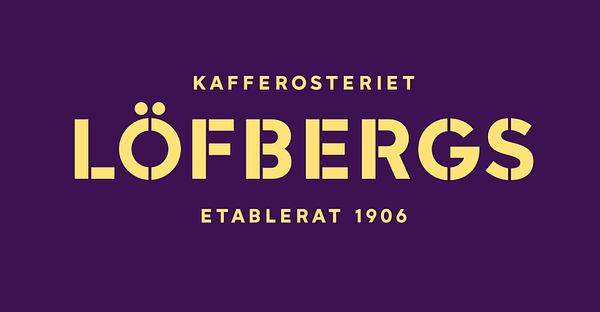Press release -
Record amount of coffee from Löfbergs - which makes major investments
The financial year 2013/2014 involves new records for Löfbergs. The family-owned coffee group increased its production to closer to 29,000 metric tons, which correspond to 10.5 million cups of coffee - per day. The company now invests SEK 100 million in a new logistics centre that creates space for future expansion.
- This is the greatest investment in the company's hundred-year history, and a stage in our long-term work for continuous growth, says Lars Appelqvist, CEO at Löfbergs.
The new logistics centre in the outskirts of Karlstad, Sweden will be approximately 50 percent larger than the current storage in central Karlstad and is estimated to be finished in the middle of 2016. This is a modern, fully automated high-bay storage that streamlines warehousing and will bring synergies to the entire group.
Sustainability leads to business
Despite a relatively consistent coffee consumption, Löfbergs increased its production to 28,741 metric tons. It is equivalent to 10.5 million cups of coffee a day
- It feels great that more people choose our coffee. It has partly to do with several new customers on the Swedish Out of Home market and partly with the success of our foreign companies, especially in Denmark and the Baltic states, says Lars Appelqvist.
- We can also establish that our sustainability work gives us numerous advantages. For a long time, we have promoted the increase of supply and demand for investments on coffee from certified farms, and that has strengthened our position and competitiveness.
Closer to the customer
Löfbergs was founded in 1906 and is one of the largest family-owned coffee roasters in the Nordic countries. The group operates on about ten core markets in Northern Europe with its own companies in Norway, Denmark, Latvia and the UK. The group sell coffee and tea under the brands Löfbergs, Peter Larsen Kaffe, Melna, Kobbs, Green Cup, Crema and Percol. 30 percent of sales come from outside Sweden’s borders.
- In the last decade, we have made several acquisitions. Through local presence, we can be closer to our customers on different markets at the same time as it has given us great prerequisites to grow together with international customers. We have done really well with that, says Lars Appelqvist.
Raw material price has an effect on turnover
Despite the record volumes, Löfbergs's turnover decreased from SEK 1,546 million to SEK 1,535 million. It is mainly due to lower coffee prices. During the year, Löfbergs's raw material costs decreased with 12 percent, from SEK 901 million to SEK 794 million.
This year's operating profit was SEK 23.6 million, which can be compared to last year's SEK 41.3 million. The change is mostly due to goodwill write-offs and heavy market investments.
| The Löfbergs group (SEK thousands) | 1 July 2013 – 30 June 2014 | 1 July 2012 – 30 June 2013 |
| Turnover | 1,534,638 | 1,545,779 |
| Operating profit | 23,590 | 41,294 |
| Balance sheet total | 955,984 | 990,766 |
| Equity | 386,499 | 388,851 |
For more information:
Lars Appelqvist, CEO, Löfbergs, +46 (0)54-14 01 29, lars.appelqvist@lofbergs.se
Topics
Categories
Löfbergs is one of the largest family-owned coffee roasters in the Nordic countries. The company has 300 employees and a turnover of SEK 1.5 billion. The head office is situated in Karlstad, Sweden and the company has its own roasting-houses in Sweden, Norway, Denmark and Latvia. The company was founded in 1906 and is today one of the world's largest importers of ecological and Fairtrade labelled coffee. Löfbergs also owns the tea brand Kobbs.

